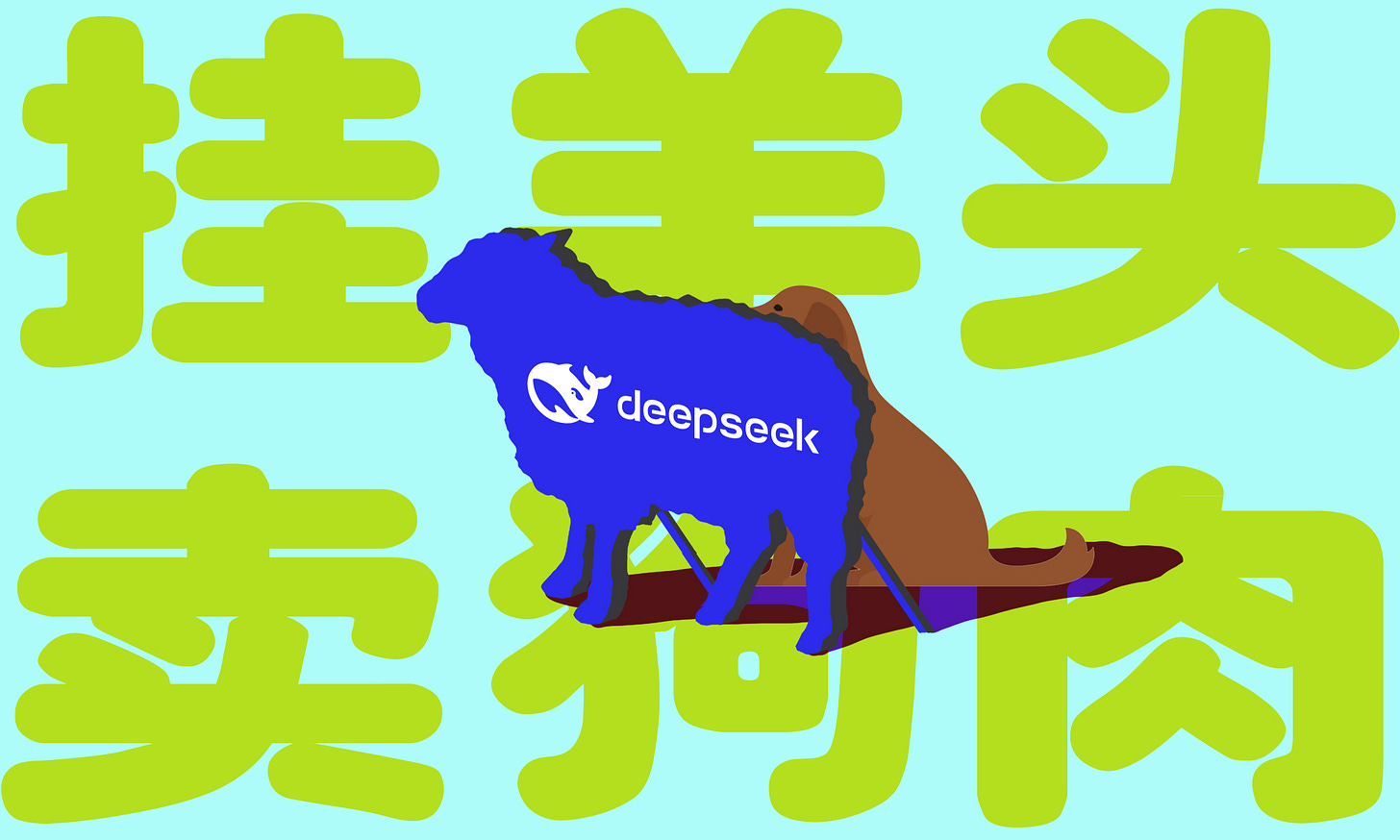"Hang a sheep’s head to sell dog’s meat" — Phrase of the Week
How "get-rich-quick" schemes, counterfeits, and scams are being sold under the DeepSeek brand

Our phrase of the week is: "hang a sheep's head to sell dog meat" 挂羊头卖狗肉 (guà yáng tóu mài gǒu ròu)
Context
The emergence of DeepSeek's R1 model, which offers performance similar to GPT-4 at a fraction of the training cost, has shaken US stock markets, shocked policymakers, and triggered frenzied debate in the Western media.
In China, the release of DeepSeek has sparked a wave of business stories.
Online influencers are capitalising on DeepSeek’s rise as the “next big thing” (known as a “wind vent” (风口) in Chinese).
According to Smart East West (智东西), online creators and merchants are offering services like local deployment (本地部署), account registration, “get rich quick using AI” courses, “how-to guides”, and knowledge-sharing memberships.
These are all paid-for services, even though a subscription to DeepSeek is free.
A few opportunistic entrepreneurs are taking advantage of DeepSeek’s popularity to make quick profits through deceptive tactics.
On the Apple App Store, counterfeit DeepSeek apps have appeared, mimicking the official brand’s name and logo. Some fraudsters have also created fake websites to trick users into subscribing, while others use them to spread malware or steal personal information.
This kind of deception is often described with a colourful Chinese phrase:
It’s not uncommon for businesses to swindle uninformed consumers, using tactics akin to "hanging a sheep’s head while selling dog meat".
在这一波热潮中,靠“信息差”割韭菜的现象也屡见不鲜,通过“挂羊头卖狗肉”的行为忽悠消费者。
Zài zhè yì bō rècháo zhōng, kào “xìnxī chā” gē jiǔcài de xiànxiàng yě lǚjiàn bù xiān, tōngguò “guà yáng tóu mài gǒu ròu” de xíngwéi hūyou xiāofèi zhě.
And with that, we have our Sinica Phrase of the Week!
What it means
"Hanging a sheep’s head while selling dog meat" (挂羊头卖狗肉 guà yáng tóu mài gǒu ròu) is a six-character idiom.
It was first referenced in The Annals of Master Yan (晏子春秋 Yànzǐ Chūnqiū), also known as the Yanzi Chunqiu. It’s an ancient Chinese text dating back to the Warring States period (475–221 BC). It's a collection of stories and speeches attributed to Yàn Yīng 晏婴, a high ranking official from the State of Qi, one of the six warring states.
The idiom is found in the following passage of the Annals:
"The ruler allows court ladies to cross-dress in the palace but forbids common women to do it; this is like hanging a cow's head at the door while selling horse meat inside."
“君使服之于内,而禁之于外,犹悬牛首于门,而卖马肉于内也。”
"Jūn shǐ fú zhī yú nèi, ér jìn zhī yú wài, yóu xuán niú shǒu yú mén, ér mài mǎ ròu (yī zuò 'pǔ') yú nèi yě."
In this earliest version of of the idiom, it talks about hanging a “cow’s head” (牛首) to sell “horse meat” (马肉).
In this dialogue, Yan Ying (晏婴) is advising Emperor Qi (齐景公) on how to address one of his failed policies. The emperor had allowed women in his court to wear men’s clothes but didn’t expect this trend to spread. When common women started copying the style, the emperor tried to ban them from wearing men’s clothes outside the palace—but it didn’t work. Yan Ying told him if he wanted the ban to be effective, he should start by enforcing it in the palace. Otherwise, it was like hanging a cow’s head to sell horse meat—sending mixed signals.
By the Song dynasty (960—1279), around one-thousand years later, the phrase had evolved to the modern form, “hanging a sheep’s head while selling dog meat” (挂羊头卖狗肉).
In modern Chinese, the phrase carries a negative connotation, implying "deception" or "dishonest practices."
In the context of online entrepreneurs profiting from DeepSeek’s rise by selling fakes and counterfeits, they are essentially "selling under false pretences" or engaging in "deceptive marketing" which is how we translate “hanging a sheep’s head while selling dog meat” in this context.
Andrew Methven is the author of RealTime Mandarin, a resource to help you learn contemporary Chinese in context, and stay on top of the latest language trends in China.
Read more about how this story is being discussed in the Chinese media in this week’s RealTime Mandarin.




Thanks, this is a good one. There's an identical saying in Burmese, even enunciated recently by the coup leader dictator-in-chief himself, I had no idea it originated in (or is at least coeval with) 汉语